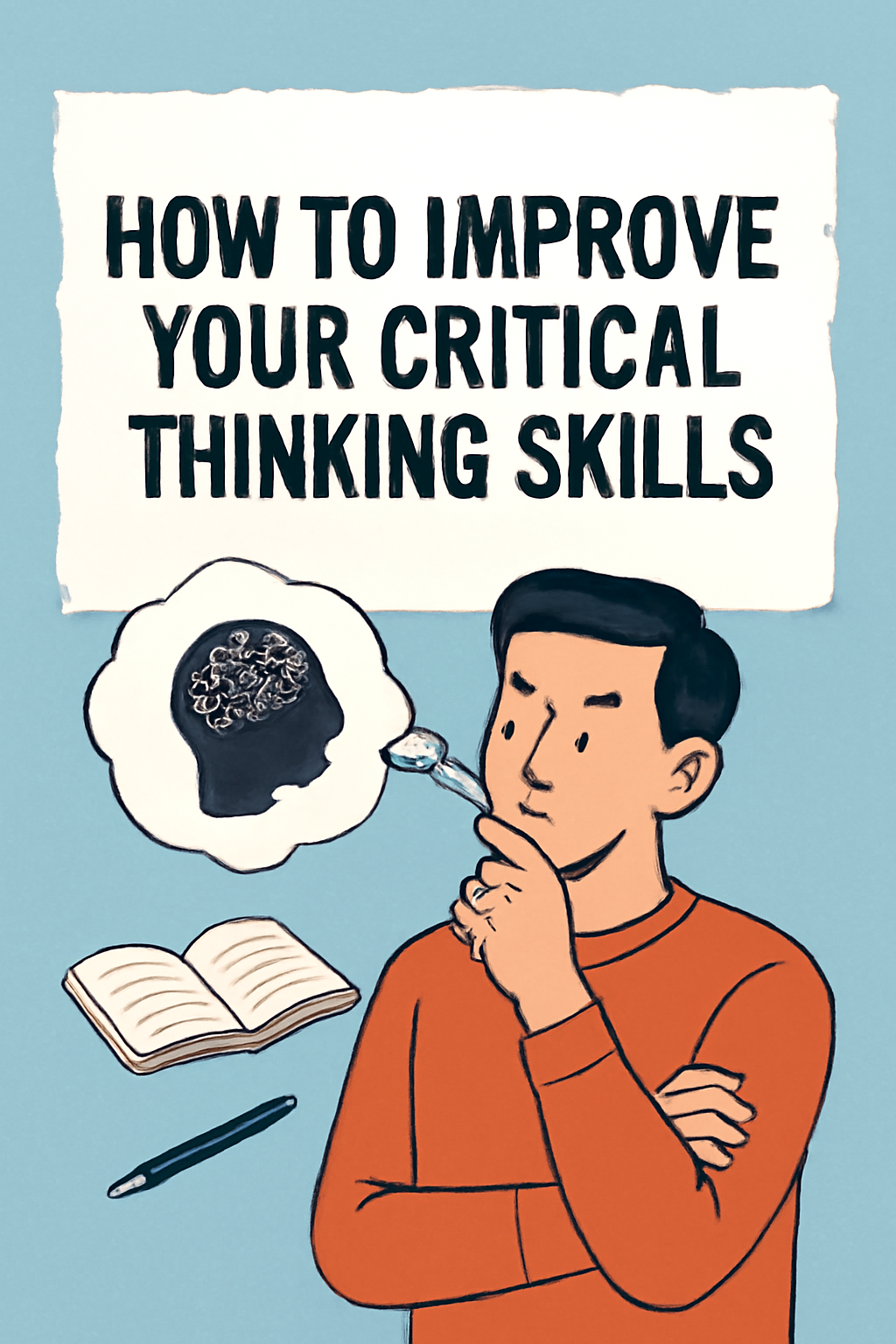Critical thinking is the ability to analyze and evaluate information, arguments, and ideas to make well-informed decisions. It involves thinking logically and systematically, questioning assumptions, and considering various perspectives before coming to a conclusion. Strong critical thinking skills are essential in problem-solving, decision-making, and everyday life. In this article, we’ll explore strategies you can use to improve your critical thinking abilities.
1. Question Assumptions
One of the first steps in critical thinking is questioning assumptions. Often, we accept things as true without considering whether they are valid. By challenging assumptions, you can avoid jumping to conclusions and consider alternative explanations.
How to Question Assumptions
- Ask “Why?”: When presented with information, ask why it is being presented as true. What evidence supports it? Is there an alternative explanation?
- Consider Other Perspectives: Look at the issue from different angles. What would someone with a different viewpoint say? By considering various perspectives, you can identify potential biases and blind spots.
- Evaluate the Source: Consider the source of the information. Is it credible? Is the person or organization presenting it biased or objective?
By questioning assumptions, you open the door to deeper understanding and more objective conclusions.
2. Analyze Information Critically
When evaluating information, it’s important to analyze it critically rather than accepting it at face value. This involves breaking down complex information into smaller parts and examining it in detail.
How to Analyze Information Critically
- Break Information into Components: Divide the information into smaller parts and examine each piece. For example, when reading an article, look at the evidence presented, the arguments made, and any conclusions drawn.
- Look for Patterns and Connections: Identify patterns, trends, and connections between different pieces of information. Are there common themes or inconsistencies? What do these patterns tell you?
- Evaluate the Logic: Assess the logic behind the arguments. Are the conclusions supported by evidence? Are there any logical fallacies or errors in reasoning?
Critical analysis helps you evaluate the quality of the information and make more informed decisions.
3. Consider Consequences and Implications
Before making a decision or forming an opinion, it’s important to consider the potential consequences and implications of your choices. Critical thinking involves thinking ahead and considering the long-term effects of your actions.
How to Consider Consequences and Implications
- Think Beyond the Immediate: Don’t just focus on the immediate effects of a decision. What might happen in the short term and the long term? How will this decision affect others?
- Weigh the Risks and Benefits: Consider both the risks and benefits of different options. What are the potential rewards, and what could go wrong?
- Consider Ethical Implications: Think about the ethical implications of your decisions. Are they fair? Do they align with your values and principles?
Considering consequences and implications ensures that you make decisions that are well-thought-out and responsible.
4. Improve Your Problem-Solving Skills
Critical thinking is closely tied to problem-solving. The better you are at solving problems, the more effective you will be as a critical thinker. Developing strong problem-solving skills helps you approach challenges in a methodical and systematic way.
How to Improve Problem-Solving Skills
- Define the Problem Clearly: Take time to understand the problem before jumping into solutions. What are the root causes? What are the key challenges?
- Generate Multiple Solutions: Don’t settle for the first solution that comes to mind. Brainstorm several possible solutions and evaluate their pros and cons.
- Test and Evaluate Solutions: Try different solutions and assess their effectiveness. Are they working as expected? If not, adjust your approach accordingly.
Effective problem-solving enhances your ability to think critically and make better decisions.
5. Stay Open-Minded
Critical thinking requires an open mind. While it’s important to have your own opinions and beliefs, it’s equally important to remain open to new ideas, information, and perspectives.
How to Stay Open-Minded
- Be Willing to Change Your Mind: If new evidence or reasoning contradicts your current beliefs, be willing to reconsider your position. Open-mindedness allows you to learn and grow.
- Avoid Confirmation Bias: Don’t just seek out information that supports your existing beliefs. Actively look for information that challenges your viewpoints to get a more balanced perspective.
- Engage in Constructive Dialogue: Engage in discussions with people who have different perspectives. Respectfully listen to their arguments and consider their viewpoints.
Open-mindedness helps you approach problems and decisions with flexibility, leading to better critical thinking outcomes.
6. Practice Regular Reflection
Critical thinking is a skill that improves with practice. One of the best ways to strengthen your critical thinking abilities is by regularly reflecting on your thoughts, decisions, and actions.
How to Practice Regular Reflection
- Keep a Journal: Write down your thoughts and reflections on key decisions and problems. This will help you identify patterns in your thinking and decision-making process.
- Review Past Decisions: Reflect on past decisions and consider what went well and what didn’t. What could you have done differently? What did you learn from the experience?
- Set Aside Time for Reflection: Dedicate time each day or week to reflect on your thoughts, actions, and decisions. This practice helps you grow as a critical thinker.
Regular reflection helps you identify areas for improvement and strengthen your critical thinking skills.
Conclusion
Improving your critical thinking skills takes time and practice, but the rewards are well worth the effort. By questioning assumptions, analyzing information critically, considering consequences, improving problem-solving abilities, staying open-minded, and practicing regular reflection, you can become a more effective decision-maker and problem solver. Strong critical thinking skills help you navigate complex situations, make better decisions, and achieve your personal and professional goals.
